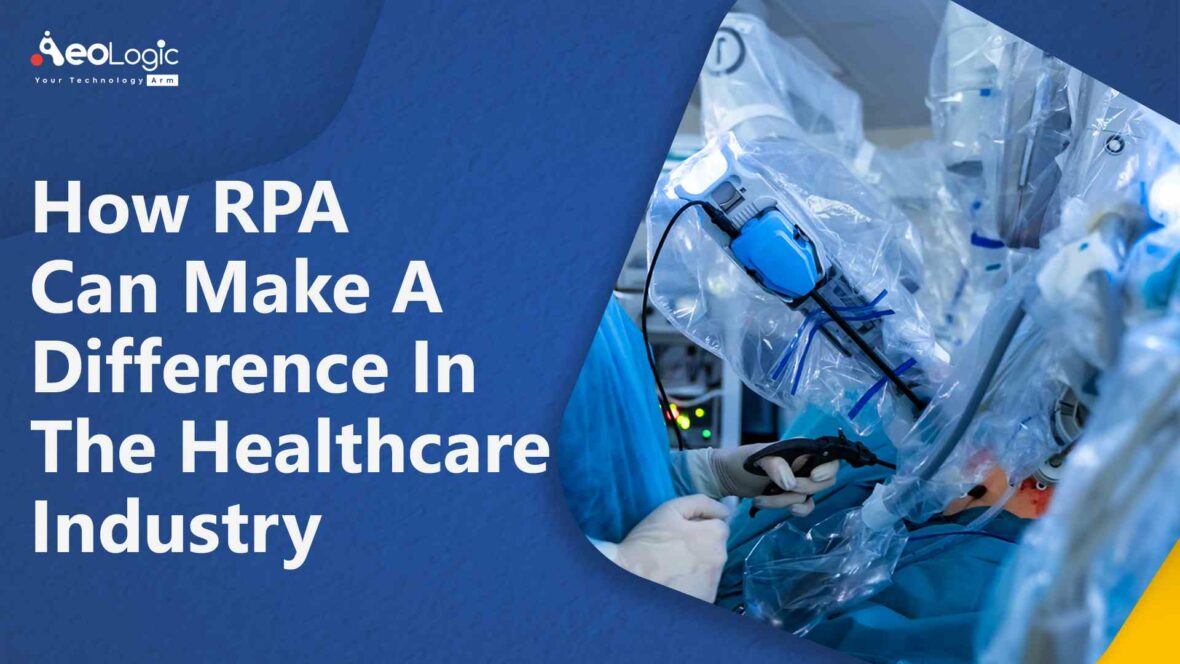One of the most expensive industries in the Healthcare industry. It is overburdened by high prices, stringent regulations, and extremely high volume. This builds up pressure that can challenge the urgency and quality of patient care. Reduction in inefficiency would make an improved healthcare system. Implementing Robotic Process Automation (RPA) in the healthcare industry would be beneficial to everyone.
RPA can automate any manual and repetitive operation that is vital to the functioning of the healthcare system. These repetitive decisions and tasks depend on the accessibility of accurate information. For example, prescription management, generating reports for physicians, claims processing, medical billing, patient admission, and follow-ups need repetitive processes which are common across almost every healthcare organization. This creates the need for RPA in the healthcare industry to enhance efficiency, improve the patient experience, and reduce costs.
Robotic Process Automation
RPA is an automation technology that implements software to simulate the back-end tasks which were done manually, like moving files, filling in forms, and extracting data. It incorporates Application Programming Interface (API), and User Interface (UI) interconnections to perform and integrate repetitive activities between productivity and enterprise applications. By adopting scripts that imitate human processes, RPA tools can execute several tasks, transactions, and activities automatically. The Healthcare industry operates in real-time, without any negligence. Error-prone and cumbersome tasks slow downs the processes. It affects everything from patience experience to compliance to cost structures. It develops efficiencies by automating the tasks that enhance the accuracy of data. It makes decisions at a fast pace with accurate data. Hence it ultimately saves cost.
Also read: AI in Healthcare: Benefits and Challenges in 2022
RPA in the Healthcare Industry
RPA in the healthcare industry can eliminate the following challenges:
1. Administrative data entry
Administrative data entry is a task that requires repetition. With the use of image recognition, speech recognition, and natural language processing (NLP), RPA can develop data inputs from several sources. Some of them might be needed to get converted to structured data by using bots. That data must then be input into a database.
2. Document Digitization Process
RPA can utilize intelligent document processing (IDP) to ingest and generate documents. It can be related to anything ranging from insurance claims to health records into a larger repository for record or use.
3. Schedule and Manage Patient Appointments
Scheduling and managing appointments are repetitive tasks. It can be put into automation by RPA tools and other systems to communicate with people. With RPA it is possible to update, cancel, change, and schedule appointments as requested by customers.
4. Bill processing
Billing and claims processes can be automated by RPA, with bots managing follow-ups, first-line inquiries, and claim management. Hence, RPA in the healthcare industry can benefit the bill processing system.
5. Managing records
The healthcare sector is extensively regulated. It requires strict protocols and reporting with respect to medical reports, patient records, and other sensitive information. All these reports rely upon the protection of records, consistency, and accuracy that can be provided by RPA.
6. Infection Control
RPA can facilitate the healthcare industry by executing infection control protocols such as
- Handling triage tasks
- Tracking CDC protocols (Center for Disease Control and Prevention), regulatory compliance, and screening
- Managing patient flow and inventory
- Supervising patient care plans and informing staff based on patient records threshold
7. Communications
RPA can be utilized in automated communications like responses to customer services, email blasts to staff, vendors, and patients, website and front-line administrator issues
8. Remote care and customer service
RPA with Intelligent Automation (IA) and Machine Learning (ML) has the potential to address frequently asked questions with consistency. RPA can also be implemented in remote care of customers, following business rules to provide certain communications at specific steps in the patient care plan.
Also read: How to Improve Health Monitoring System Using IoT
Conclusion
Above were a few ways in which RPA can benefit the healthcare system. It can reduce human error, repetitive tasks, and manual interactions. It can also save costs which can be further used in other necessary investments. It enhances the patient experience and patient care plan. Successful implementation of RPA in the healthcare industry needs a holistic approach to examine where automation can offer advantages, and resource availability to aid the system. Therefore, RPA can increase the efficiency of healthcare organizational processes.
Aeologic Technologies PVT, LTD., can facilitate your business requirements. If you are looking to augment your business operations and want to simplify tasks, then connect with Aeologic Technologies.
FAQs
How RPA can transform the healthcare industry?
RPA can augment the speed of activities while eliminating the risk of human errors, improves the patient experience, enhance the efficiency of business processes, and simplify tasks.
How RPA can benefit the healthcare industry?
RPA can reduce healthcare administration costs, improves the reporting in clinical settings, and enhances the accuracy of tasks. It also speeds up triage with the help of the automation of mundane tasks.






